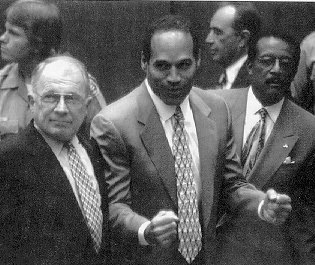
Stanley "Tookie" Williams is responsible for co-founding what is now one of the largest criminal street gangs in the world. Even in my own little county, there are children dying and killing in the name of the organization planned and built by Tookie. Since his conviction in 1981 for murdering four people during two robberies, Tookie has done the following:
Maintained his innocence
Written a few poorly selling "anti-gang" children's books
Spoken out against gang violence
Devised rarely used "peace protocols" for gangs
Claimed (on his website) to have saved one hundred and fifty thousand lives
Been nominated for several humanitarian awards (easy), but never received one (hard)
Refused to "rat out" his former Crips associatesNothing Tookie has ever done justifies his execution. Nor does anything he has ever done justify clemency. But the execution of
anyone is still wrong, and for several reasons having nothing to do with Tookie's supposedly redemptive post-conviction life. Two reasons which are often overlooked, and which have never been addressed in a published appellate opinion are outlined briefly below.
The Death Penalty is Impermissibly Retributive
Capital punishment is constitutionally permissible only if it
measurably contributes to deterrence, incapacitation, or retribution.
Coker v. Georgia (1977) 433 U.S. 584. The fact that the death penalty has
never been proven to have any deterrent effect or to incapacitate any more effectively than life imprisonment has never mattered, however, because few would doubt that the death penalty significantly contributes to the goal of
retribution, whether or not that goal is morally justifiable.
The problem for the massed would-be killers of Tookie and his Californian ilk is that, while the United States Constitution
permits states to impose predominantly retributive punishments, the state of California has chosen to
prohibit such punishments.
In re Estrada (1965) 63 Cal.2d 740, 745 (holding that a punishment "motivated by a desire for vengeance" is "not permitted in view of modern theories of penology"); also
People v. Cowsar (1974) 40 Cal.App.3d 578, 580 (citing
Estrada and rejecting retribution as a legitimate end for
any punishment).
The Death Penalty is Religious Speech The concept of execution as "punishment" assumes that the condemned man is able to experience a loss as a result of his punishment. That would only be the case if (1) there is an afterlife, and (2) life after death is worse than life before. Thus the death penalty is predicated upon the judaeo-christian doctrine of a merit-based afterlife, in violation of the First Amendment's prohibition against governmental advancement or endorsement of religion.
********
America is the only nation which executes primarily out of revenge. (Other executing nations, unhindered by "due process of law," are able to also reap the
deterrent benefit of swift, frequent, and public executions.)
When we kill out of vengeance, we place ourselves below the most despicable of the condemned. Only when the executions stop may we dare to call ourselves civilized.






